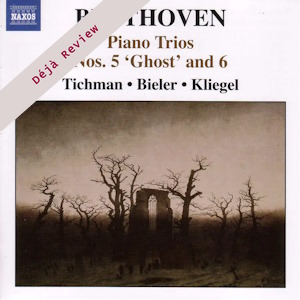
Déjà Review: this review was first published in October 2005 and the recording is still available.
Ludwig van Beethoven (1770-1827)
Piano Trio No 5 in D, Op 70 No 1, ‘Ghost’ (1808)
Piano Trio No 6 in E-flat, Op 70 No 2 (1808
Variations in E-flat, Op 44 (c1792, publ. 1804)
Xyrion Trio
rec. 2004, Clara Wieck Auditorium, Sandhausen, Germany
Naxos 8.557723 [72]
My recording of the month, without a shadow of a doubt. The Xyrion Trio is new to me as an ensemble (although not individual names: Nina Tichman, piano; Ida Baker, violin; Maria Kliegel, cello).
Formed in 2001, this all-female group clearly shows deep affinity with the music of Beethoven. A complete series of trios from his source is to be welcomed, and nearly unreservedly at that.
The so-called ‘Ghost’ Trio is one of the best known of this side of Beethoven’s output – second only probably to the ‘Archduke’. The first movement is marked ‘Allegro vivace e con brio’ and it is certainly that here – nearer a Presto, in fact. It carries more than its fair share of excitement, an excitement projected all the more forcefully by the Xyrion Trio’s unanimity of ensemble and interpretative thought. Nods towards the authentic in low-vibrato violin playing work well. The ‘Largo assai ed espressivo’ slow movement includes moments of real mystery and – importantly – spontaneity, despite the studio origin of this disc. Interestingly the Trio makes a point of relating the Presto finale to the slow movement whenever they can. Yet what pervades this finale is an entirely apt sense of youthful fun.
The second Trio of Op. 70 is less well-known. The Xyrion play with real belief in the work’s merits. The Poco sostenuto introduction has a real sense of breadth and anticipation before the first movement proper, which begins with gritty cello playing marked by its determination. The Xyrion has the musical wherewithal to enjoy the moments of respite and still preserve the movement’s structural integrity.
The gentle, appealing Allegretto that follows has a wonderfully evocative, hesitant close that leads into the Allegretto ma non troppo – note there is no ‘real ‘ slow movement to this Trio. Maria Kliegel’s cello ‘stretches’ the initial melody into life. There is the intimacy of chamber invention present here in every bar, an intimacy that acts in contrast to the vigour of the finale. The Trio evidently enjoys the shifting emotions of this movement.
The Op. 44 Variations form a delightful way to close this well-filled release. The Theme is ultra-simple, given out in octaves. There are challenges here – note the deceptive ease of Kliegel’s cello in the Fourth Variation, where decorations are dispatched with deceptive ease. The Seventh Variation is in E flat minor and again Kliegel impresses, her cello singing in best lachrimose manner … and Bieler’s continuation hardly disappoints, either. The Trio treats this work as seriously as the Op. 70 ‘meat’ of the disc, and it pays off in spades.
A wonderful disc, well recorded and containing some magnificent playing. Do hear this.
Colin Clarke
Buying this recording via a link below generates revenue for MWI, which helps the site remain free



















